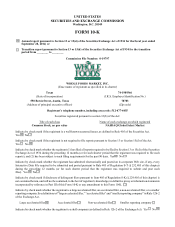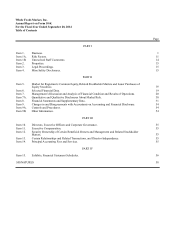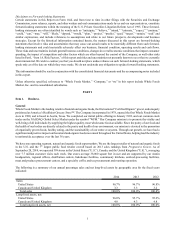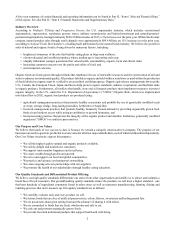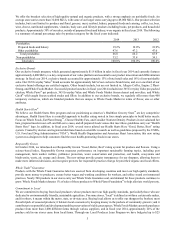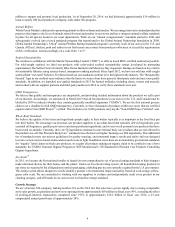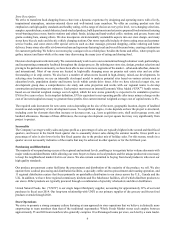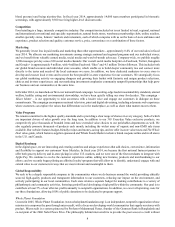Whole Foods 2014 Annual Report Download - page 5
Download and view the complete annual report
Please find page 5 of the 2014 Whole Foods annual report below. You can navigate through the pages in the report by either clicking on the pages listed below, or by using the keyword search tool below to find specific information within the annual report.2
A five-year summary of certain financial and operating information can be found in Part II, “Item 6. Selected Financial Data,”
of this report. See also Part II, “Item 8. Financial Statements and Supplementary Data.”
Industry Overview
According to Nielsen’s TDLinx and Progressive Grocer, the U.S. supermarket industry, which includes conventional
supermarkets, supercenters, warehouse grocery stores, military commissaries and limited-assortment and natural/gourmet-
positioned supermarkets, had approximately $620.2 billion in sales in 2013, a 3% increase over the prior year. Within this broader
category, natural product sales through retail channels were approximately $89.4 billion, an 11% increase over the prior year,
according to Natural Foods Merchandiser, a leading trade publication for the natural foods industry. We believe the growth in
sales of natural and organic foods is being driven by numerous factors, including:
• heightened awareness of the role that healthy eating plays in long-term wellness;
• a better-educated and wealthier populace whose median age is increasing each year;
• a highly influential younger generation that values health, sustainability, organic, local and ethical trade;
• increasing consumer concern over the purity and safety of food; and
• environmental concerns.
Organic foods are foods grown through methods that emphasize the use of renewable resources and the conservation of soil and
water to enhance environmental quality. All products labeled as organic and sold within a retail store or used within the production
of foods labeled as organic must be verified by an accredited certifying agency. Organic equivalency arrangements between the
U.S., Canada, the European Union, Japan, and Korea help protect organic standards, enhance cooperation, and facilitate trade
in organic products. Furthermore, all retailers that handle, store and sell organic products must implement measures to protect
organic integrity. In the U.S., under the U.S. Department of Agriculture’s (“USDA”) Organic Rule, which was implemented
into federal law in 2002, organic food products are produced using:
• agricultural management practices that promote healthy ecosystems and prohibit the use of genetically modified seeds
or crops, sewage sludge, long-lasting pesticides, herbicides or fungicides;
• livestock management practices that promote healthy, humanely treated animals by providing organically grown feed,
fresh air and outdoor access while using no antibiotics or growth hormones; and
• food-processing practices that protect the integrity of the organic product and disallow irradiation, genetically modified
organisms (“GMOs”) or synthetic preservatives.
Our Purpose and Core Values
We believe that much of our success to date is because we remain a uniquely mission-driven company. The purpose of our
business is not only to generate profits but to create value for all of our major stakeholders, each of which is linked interdependently.
Our Core Values succinctly express this purpose:
• We sell the highest quality natural and organic products available.
• We satisfy, delight and nourish our customers.
• We support team member happiness and excellence.
• We create wealth through profits and growth.
• We serve and support our local and global communities.
• We practice and advance environmental stewardship.
• We create ongoing win-win partnerships with our suppliers.
• We promote the health of our stakeholders through healthy eating education.
Our Quality Standards and Differentiated Product Offering
We believe our high quality standards differentiate our stores from other supermarkets and enable us to attract and maintain a
broad base of loyal customers. Our groundbreaking quality standards ensure the products we sell meet a higher standard – one
that bans hundreds of ingredients commonly found in other stores as well as numerous manufacturing, farming, fishing and
ranching practices that don’t measure up. Our quality standards are as follows:
• We carefully evaluate each and every product we sell.
• We feature foods that are free of artificial preservatives, colors, flavors, sweeteners and hydrogenated fats.
• We are passionate about great tasting food and the pleasure of sharing it with others.
• We are committed to foods that are fresh, wholesome and safe to eat.
• We seek out and promote organically grown foods.
• We provide food and nutritional products that support health and well-being.

